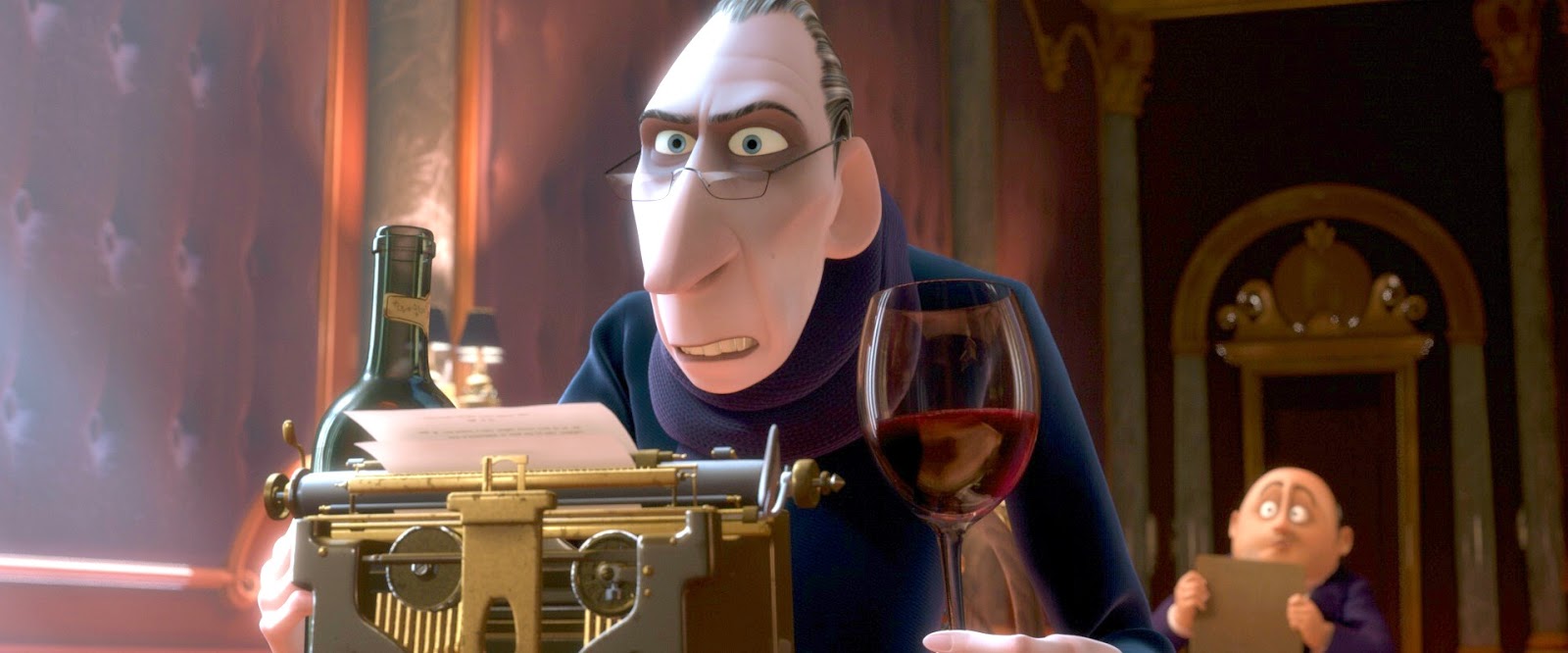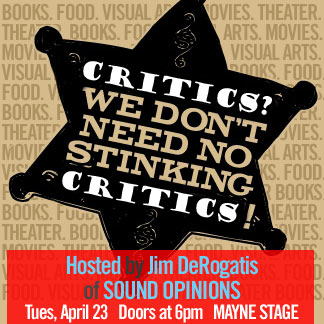We don’t need no stinkin’ critics… or do we?
By Jim DeRogatis

We don’t need no stinkin’ critics… or do we?
By Jim DeRogatis
Criticism—which I define as the attempt to intellectually convey your emotional response to a work of art, via context, insights, and the evidence to back those insights up—always has been distinctly different from and vastly superior to mere opinion.
The latter never is lacking: You know what they say about opinions and everyone having one. Such is the human animal that we can assume the first Cro Magnons were grunting pro or con about one another’s cave paintings 43,000 years ago. But in today’s solipsistic Twitterverse, we arguably are drowning in more vacuous, empty-headed opinion than at any point in history, leading some to exclaim (via the Mexican-American actor Alfonso Bedoya in the 1948 film The Treasure of the Sierra Madre): “Critics? We don’t need no stinkin’ critics!”
Or do we?
Well, yes, of course we do, so long as some small minority of us still think of art as so much more than mere entertainment and yet another disposable product to be quickly consumed and consigned to the compost. And maybe that minority is not even as minor as skeptics think: Witness the incredible response of this city and this country to the death of Roger Ebert two weeks back.
Sure, some of the outpouring of commentary was about Ebert’s celebrity. But much of it was celebrating a man who thought deeply and cared passionately about the art form he loved. Because of that, he connected with people to the same extent as some of the artists he wrote about. And many art forms have given us his equal, from Ebert’s mentor Pauline Kael to pioneering food writer M.F.K. Fisher, and from theater critic Dorothy Parker to rock critic Lester Bangs.
I could say much (much, much) more about this topic, but I want to save something for tomorrow night (and more about that in a minute). But if criticism in general and the role of the critic in the age of the Internet in particular are topics of interest, I cannot recommend highly enough the Winter 2013 issue of Nieman Reports, “Critical Condition: Why Professional Criticism Matters.”
“Criticism’s condition is critical—to informing and inspiring the public and to keeping our cultural conversations alive,” Nieman deputy curator James Geary writes in his introduction. Among the highlights that expand on that view in this free online publication: a lengthy interview with Robert Christgau, “the dean of American rock critics”; a thoughtful essay by Pulitzer Prize winner and former Chicago Tribune book reviewer and cultural critic at large Julia Keller (“The Reviewer Reviewed”), and a piece entitled “Consumer Retorts” by Kimberly D. Kleman, editor in chief of Consumer Reports, which poses the question, “When everybody’s a critic, what’s the role of a professional reviewer?”
The short version of Kleman’s answer: The professional critic (which means those who critique with professional standards, and that has nothing to do with whether or not they’re getting paid) approaches his or her work with impartiality, the desire to dig deep, and the goal of unfailing honesty to the reader, sans distractions from editors, industries, pundits, or anyone else. And those standards are as valid when one is reviewing the blenders on offer at Target as they are when strolling the galleries at the Art Institute of Chicago.
These factors, plus accountability, are what separates the critic from the anonymous Yelper. A few weeks ago, my pal Jason Gross, editor of the excellent online music zine Perfect Sound Forever, sent an email linking to the aggregated music critiques, genuine or parody, of one Gilby Mitnick III Jr., who proudly claims to be scribbling away in his mother’s basement.
“World’s worst rock critic?” Gross asked. “Well, it isn’t me anymore! This guy on Amazon is clearly the winner. He ties every album into a slap about Obama, [and] frequently repeats the same info (which is often wrong). He’s either a parody of wingnuts or someone who works for Fox News.”
Me, I think he’s a twisted genius of sorts, and one who should be recognized right beside the brilliant duo of Tom Scharpling and Jon Wurster with their Rock Rot & Rule project. That is to say, for sheer absurdity and comedic value, Mitnick is well worth reading. But, really, have you ever seen any site like Yelp or Amazon that provides better than one in twenty crowd-sourced reviews that are worth your time and attention?
Again, this is not to denigrate the “amateur” critic. My Sound Opinions cohort Greg Kot and I always have been sincere when we’ve said that “everyone is a critic,” and that we never intend to be the final word, just the one that gets the conversation started. But every critic worth his or her salt thinks that way, as was amply evidenced in a wonderful roundtable discussion convened by TimeOut Chicago theater critic Kris Vire in 2008 entitled “Critical condition: Chicago’s top taste makers discuss why they critique culture—and why anyone should listen to them.”
Nicking the idea from Douglas Reichert Powell, director of Columbia College’s Professional Writing Program, I’ve been having my Reviewing the Arts classes read that piece every semester. But as much as the fundamentals have remained the same, quite a few things have changed in the whiplash world of the Net over the last five years, so it was with the goal of freshening up the conversation that I pitched WBEZ the idea of a new discussion entitled “We Don’t Need No Stinkin’ Critics,” a free event taking place at Mayne Stage in Rogers Park (1328 W. Morse Ave.) at 7 p.m. Tuesday (April 22).
Joining me as moderator are a few veterans of Vire’s original discussion, including the man himself; everyone’s favorite Chicago book critic Donna Seaman, and our behind-the-scenes facilitator Don Hall (WBEZ events guru by day, theater impresario and blogger by night). Among the fresh voices: Sarah Zupko, editor of the Chicago-based Pop Matters; Andrew Barber, editor of the hip-hop blog Fake Shore Drive; LaShawn Williams, arts editor of Gapers Block; Jim “Tankboy” Kopeny, ace music writer at Chicagoist; Duncan MacKenzie and Richard Holland, co-founders and contributors to the Bad at Sports art blog, and two of my former students, Drew Hunt, editorial assistant and sometime film reviewer at the Reader, and Leah Pickett, WBEZ culture blogger and freelance contributor to the Tribune Dining section.
Oh, yeah, we also have a great dining critic, whose name I cannot share and whose likeness you will not actually see, based on that weird but necessary policy of restaurant critics having to maintain their anonymity if they want to be able to do their jobs right. (And here I’ve only ever had to worry about losing my hearing!)
The audience will be invited to critique the critics while all this is going down, with real-time Twitter commentary projected behind the panel. And if you’re thinking that all of that may be a bit too meta or highbrow, well, Mayne Stage is a fine restaurant as well as a great music venue, and while I won’t say the hurling of your dinner salad’s tomatoes is encouraged, well… everyone’s a critic.

Follow me on Twitter @JimDeRogatis or join me on Facebook.
